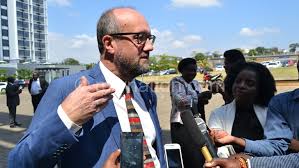The World Bank Board of Executive Directors approved on June 19, 2020, a total of $157 million for the Malawi Watershed Services Improvement Project (MWASIP), composed of a $78.5 million credit and $78.5 million grant from the International Development Association (IDA)*
Malawi’s water resources are under threat from severe land degradation and loss of forest cover. Critical watersheds are becoming degraded, leading to reduced water availability, deteriorating water quality, increased vulnerability to droughts and floods, reduced energy security, and reduced agricultural productivity. The project will therefore help to increase the adoption of sustainable landscape management practices in priority watersheds and improve watershed services and rural livelihoods. The project is the first in a series of operations aimed at supporting the implementation of the National Forest Landscape Restoration Strategy.

“Nearly 8 million hectares, which is 80 percent of the total land area of Malawi, is degraded and requires restoration. Soil erosion and nutrient depletion are the most severe forms of land degradation that affect more than 60 percent of the entire land area. We have committed in our strategy to restore 4.5 million hectares of degraded land by 2030, and this project is the first opportunity we must invest at scale in reversing landscape degradation and protecting our most important watersheds,” says Dr. Henrie Njoloma, Secretary for Irrigation and Water Development.
Within the first three years, the project will provide $40 million in livelihood support to over a quarter million beneficiaries through various community grant schemes designed to encourage better land stewardship. In additional to the grants, the project makes available $45 million worth of water infrastructure, including 10 small multipurpose dams, 20 rainwater harvesting structures and 10 small-scale irrigation schemes to increase access to water for productive use. The infrastructure will create over 2,500 construction jobs and give people the chance to work and earn.
“Land degradation in Malawi is a major challenge, arising from environmental, climatic and other pressures. Previous projects, supported by the World Bank and other partners, have demonstrated that it is possible to restore degraded landscapes through an integrated package of interventions involving land and water management,” says Greg Toulmin, World Bank Country Manager for Malawi. “So, we see a long-term partnership between the World Bank and the Government of Malawi as crucial to these efforts at improving livelihoods and building rural resilience, especially in the context of Malawi’s recovery from the impacts of the COVID-19 pandemic.”
The project will enhance the capacity of watershed management institutions at all levels to sustain interventions beyond the project and builds on the success of another World Bank-supported project, the Shire River Basin Management Project, which the Government of Malawi implemented from 2012 to 2019.
- The World Bank’s International Development Association (IDA), established in 1960, helps the world’s poorest countries by providing grants and low to zero-interest loans for projects and programs that boost economic growth, reduce poverty, and improve poor people’s lives. IDA is one of the largest sources of assistance for the world’s 76 poorest countries, 39 of which are in Africa. Resources from IDA bring positive change to the 1.6 billion people who live in IDA countries. Since 1960, IDA has supported development work in 113 countries. Annual commitments have averaged about $21 billion over the last three years, with about 61 percent going to Africa


